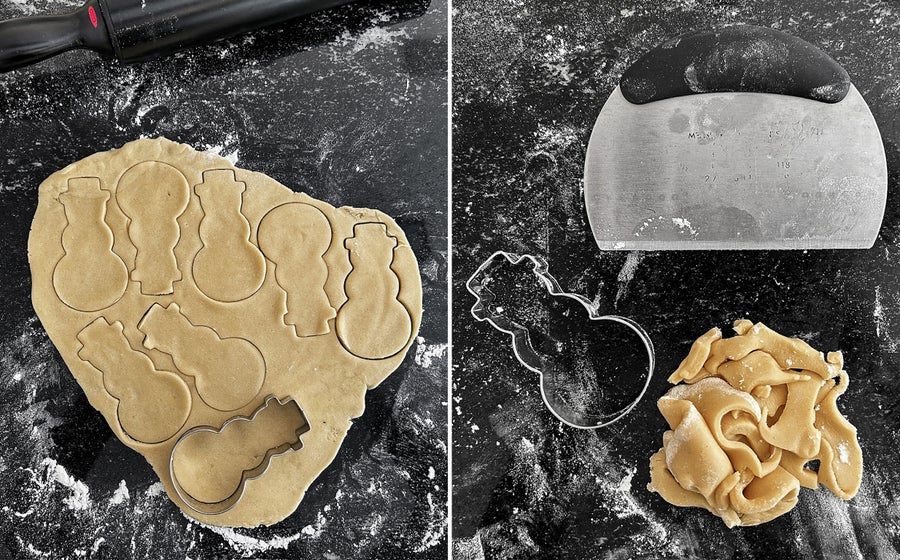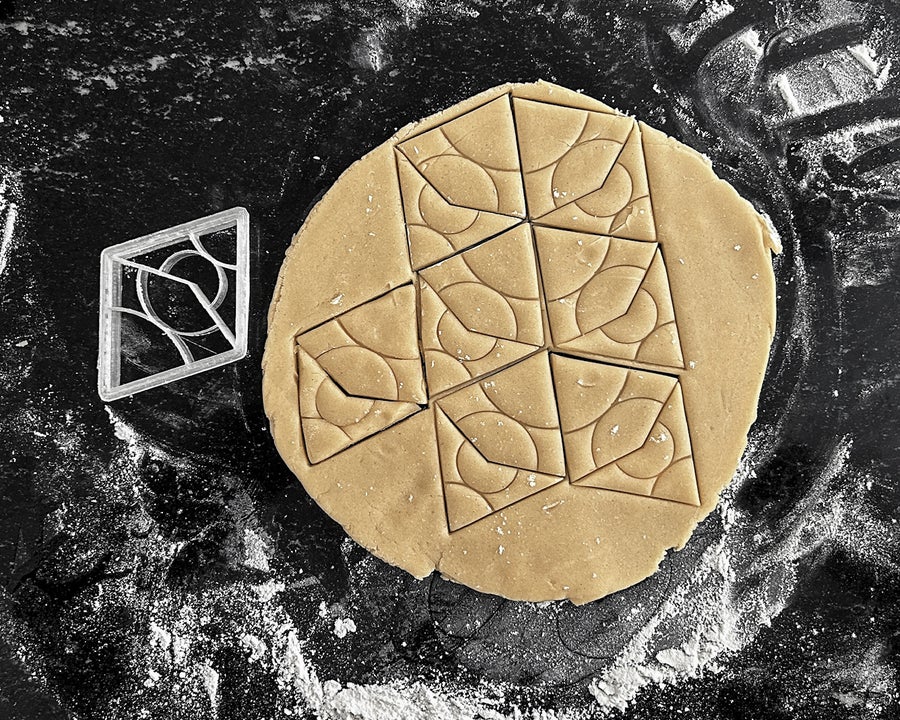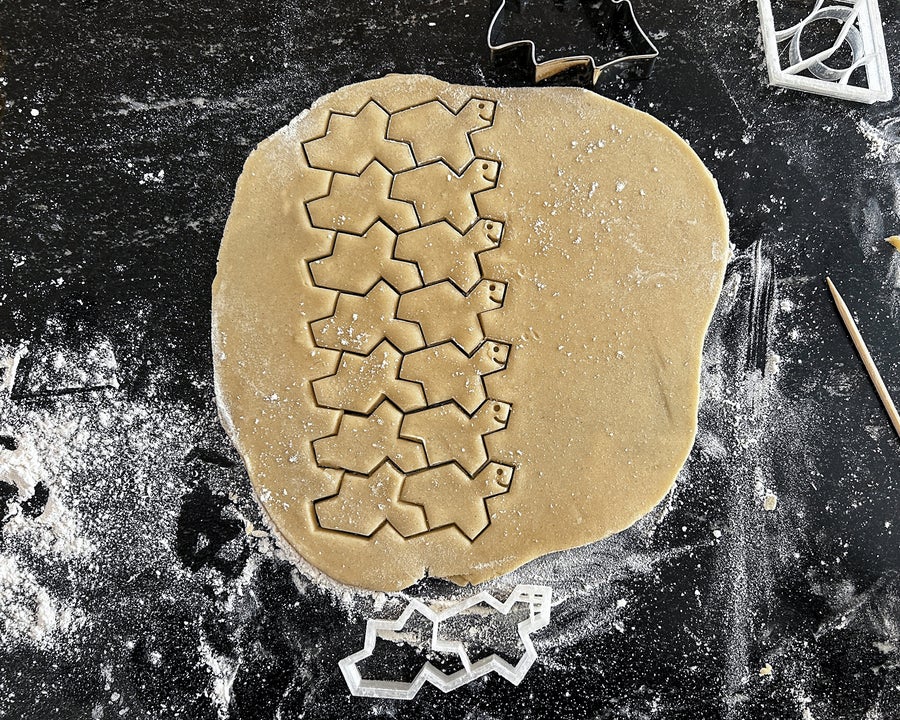December 23, 2024
5 min learn
A Little Math Can Streamline Vacation Cookie Making
Making cookies is time- and labor-intensive. Right here’s how slightly math could make it simpler and fewer wasteful this vacation season
A cookie cutter that creates a tessellation can save time and expend extra dough.
When our youngsters have been little, we spent plenty of time within the kitchen collectively. We used the events to surreptitiously train them about science: warmth and temperature, fluid circulation, density, viscosity, bodily adjustments, chemical reactions, acids and bases. We informed them how these properties mixed to magically make muffins rise with carbon dioxide; we informed them about yeasts and different fascinating microorganisms.
We additionally talked about math: weights and measures, areas and volumes. Pizza is a good way to introduce fractions. We loved baking cookies collectively and used many alternative cookie cutters. Our son liked dinosaurs so we had dinosaur cookie cutters, but in addition flowers, hearts, stars and animals. An fascinating conundrum got here up once we used the cookie cutters: they left gaps between every form we reduce out. To make use of up all of the dough, it needed to be rerolled. However then it warmed up and needed to be chilled earlier than we may reduce it once more. This took time.
There needed to be a extra environment friendly approach to divide the dough.
On supporting science journalism
In the event you’re having fun with this text, take into account supporting our award-winning journalism by subscribing. By buying a subscription you might be serving to to make sure the way forward for impactful tales concerning the discoveries and concepts shaping our world as we speak.

Making cookies utilizing extra conventional cookie cutters typically leaves plenty of leftover dough.
Being a mathematician, I had heard about tilings and tessellations, which confer with the masking of a floor, utilizing a number of geometric shapes, with no overlaps and no gaps. That was the reply to the cookie cutter downside!
So I seemed for tessellating cookie cutters however discovered solely squares and hexagons. They work however usually are not significantly fascinating, so far as shapes go. After which, about 15 years in the past, the primary 3D printers arrived. It was attainable to make customized cookie cutters, after which it grew to become a matter of selecting the form. Many figures can be utilized to tessellate, reminiscent of common or irregular triangles, rectangles or some irregular pentagons. A few of the irregular pentagons have been found by the late beginner mathematician Marjorie Rice and could be seen in Mathemalchemy, a creative and mathematical exhibit with collaborators together with Duke College mathematician Ingrid Daubechies and textile artist Dominique Ehrmann. The exhibit additionally exhibits a tessellating cookie cutter utilizing the image for pi, suitably tweaked by Daubechies.
There are different examples; Islamic artwork consists of stunning and inventive designs utilizing pentagonal symmetry.
If we be a part of two or extra figures then there are a lot of extra choices. For instance, octagons and squares, or pentagons and rhombuses, or all of the wonderful work by M.C. Escher. However not all make for good cookies; we made a cookie cutter within the form of certainly one of Escher’s lizards however the legs broke once we separated the figures.
All these tessellations are periodic, which suggests they’ve a repeating sample. Within the Nineteen Seventies Roger Penrose discovered two figures referred to as kites and darts that tile a aircraft solely aperiodically (that means that every one attainable configurations are nonperiodic) if some native guidelines, specifying which sides of the dart can contact one another, are obeyed. But when the principles usually are not obeyed then they tile periodically. And that is good for a cookie cutter as a result of the uncooked dough is tiled periodically, after which the cookies could be positioned periodically or nonperiodically. There’s extra details about Penrose tiles within the video channel Veritasium and at a Net web page titled “A Penrose-type Islamic Interlacing Pattern.”

A tessellating cookie cutter, reminiscent of this one within the form of a kite and dart, creates a pleasant sample and makes use of up extra dough than different shapes.
A few years in the past, utilizing a 3D printer, with plenty of assist from my pals, I made a cookie cutter within the form of a kite and dart collectively in a approach that tiles periodically. After baking, the items could be positioned periodically or nonperiodically. This labored superbly.
After which the Hat arrived.
For about 50 years mathematicians puzzled if there might be one single determine that tiled a aircraft aperiodically. And in 2023 David Smith, Craig Kaplan, Chaim Goodman-Strauss and Samuel Myers managed to search out the elusive aperiodic monotile, which they referred to as “the Hat” or “einstein.”
My first impulse was to make a cookie cutter within the form of the Hat. It turned out to be extraordinarily tough to position the items with out gaps or overlaps. However the individuals who discovered the Hat really additionally realized it might be reworked into an infinite variety of aperiodic monotiles, as reported by Craig Kaplan. Three of the monotiles can tile each periodically and nonperiodically, and they’re good as cookie cutters.
A chevron that Smith and crew referred to as “Tile (0,1)” is simple to make, straightforward to make use of on the dough, and the baked cookies are straightforward to position in stunning patterns, particularly if they’re adorned with totally different colours. One other good candidate is what the authors referred to as “Tile (1,1).” This determine tiles periodically when mixed with its mirror picture however solely aperiodically if the mirror picture shouldn’t be allowed. Subsequently, the right cookie cutter has two of those figures, one regular and one mirrored.

A cookie cutter based mostly on the Hat, found by David Smith, makes a tessellating sample that wastes little dough.
Smith and collaborators additionally invented a class of curved aperiodic monotiles, which they referred to as “Spectres,” which is also became cookie cutters, as may the just lately found mushy cells. In every of those cases, in case you are cautious, you’ll be able to reduce your cookie dough with minimal rerolling and waste.
As you prepare dinner and bake over the vacations, if you’ll find a tessellating cookie cutter and should you contain your kids, you’ll be able to take the time you’d have spent rerolling dough to inform them about science and math. In our case, our youngsters are grown, however my assortment of tessellating cookie cutters and I are excited to share the wonders of math and science when our grandchildren arrive.
That is an opinion and evaluation article, and the views expressed by the creator or authors usually are not essentially these of Scientific American.

